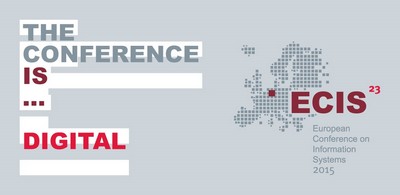Abstract
Virtual teams play an increasingly important role in the modern economy, and many organizations struggle to overcome the weaknesses inherent in technology-mediated work. Identity communication has been shown to greatly improve individual- and group-level outcomes in offline settings, but these benefits have not been investigated in the context of virtual teams, where mediated interaction can affect the opportunity for identity communication. This research-in-progress paper proposes a theoretical model and experimental design that investigates the predictors and outcomes of identity communication in virtual teams. Our anticipated findings should have important implications for researchers seeking to understand identity communication via technology and for practitioners hoping to improve virtual team communication and collaboration. \
Recommended Citation
Wilson, David W.; Brown, Susan A.; and Thatcher, Sherry M., "Examining Predictors and Outcomes of Identity Communication in Virtual Teams" (2015). ECIS 2015 Research-in-Progress Papers. Paper 20.
ISBN 978-3-00-050284-2
https://aisel.aisnet.org/ecis2015_rip/20


